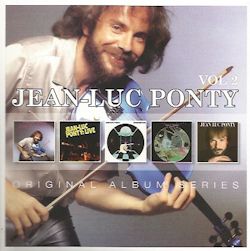A Taste for Passion
|
1. Stay With Me
|
5:35
|
|
2. Sunset Drive
|
5:45
|
|
3. Dreamy Eyes
|
4:18
|
|
4. Beach Girl
|
4:56
|
|
5. A Taste For Passion
|
5:22
|
|
6. Life Cycles
|
5:45
|
|
7. Reminiscence
|
1:26
|
|
8. Give Us A Chance
|
3:20
|
|
9. Obsession
|
0:40
|
|
10. Farewell
|
|
Jean-Luc Ponty – Live
|
Aurora
|
|
|
1. Part I
|
2:54
|
|
2. Part II
|
6:37
|
|
Imaginary Voyage
|
|
|
3. Part III
|
4:05
|
|
4. Part IV
|
7:15
|
|
5. Mirage
|
5:52
|
|
6. No Strings Attached
|
5:58
|
|
7. Egocentric Molecules
|
|
Civilized Evil
|
1. Demagomania
|
6:25
|
|
2. In Case We Survive
|
4:06
|
|
3. Forms Of Life
|
4:48
|
|
4. Peace Crusaders
|
5:38
|
|
5. Happy Robots
|
4:14
|
|
6. Shape Up Your Mind
|
5:15
|
|
7. Good Guys, Bad Guys
|
4:41
|
|
8. Once A Blue Planet
|
|
Mystical Adventures
|
Mystical Adventures (Suite)
|
(20:28)
|
|
1. Part I
|
3:28
|
|
2. Part II
|
3:37
|
|
3. Part III
|
7:30
|
|
4. Part IV
|
0:47
|
|
5. Part V
|
5:06
|
|
6. Rhythms Of Hope
|
4:03
|
|
7. As
|
5:49
|
|
Final Truth
|
(7:02)
|
|
8. Part I
|
4:55
|
|
9. Part II
|
2:07
|
|
10. Jig
|
|
Individual Choice
|
1. Computer Incantations For World Peace
|
5:40
|
|
2. Far From The Beaten Paths
|
5:58
|
|
3. In Spiritual Love
|
7:00
|
|
4. Eulogy To Oscar Romero
|
2:34
|
|
5. Nostalgia
|
5:00
|
|
6. Individual Choice
|
4:56
|
|
7. In Spite Of All
|
|
This is the second volume by Jean-Luc Ponty in Warner’s “Original Album Series”, which pack five original albums into envelopes inside a slipcase. It seems
like good value, although the minimal packaging means that you don’t get all the things you would normally get with CDs. There are no sleeve-notes to guide
the new listener through the music of Jean-Luc Ponty (perhaps there were no notes with the original albums?). The personnel details are in such small print
as to need a microscope to read. Nevertheless, this package IS good value: you can probably buy it for £10, which is a snip at £2 per disc.
I was perhaps most impressed by Ponty’s early recordings, which presented us with a thrilling new sound from an exciting violinist, following in the
footsteps of such fiddlers as Stuff Smith, although with a completely new sound derived from the use of electric violins. As time went on, Ponty widened
his palette to include a greater use of synthesisers, as you can hear in these five albums, which date from 1979 to 1983.
A Taste for Passion
shows how far Ponty had moved from the early days of the violin performing in a jazz context. In fact synthesisers are so prominent that they almost seem
in danger of swamping the violin. But Ponty’s swirling figures on violin are still present. The general atmosphere is of psychedelic rock rather than jazz,
although Sunset Drive has a jazzy shuffle beat, with a groovy fretless bass solo reminiscent of Jaco Pastorius in its brilliance. Life Cycles and Give Us a Chance are pure jazz-fusion, still with emphasis on the guitars and synths, although some of the sound may be
the violin processed electronically.
Lean-Luc Ponty: Live
presents a 1979 concert before an enthusiastic audience. With an apparently smaller line-up, we can hear Ponty’s violin more clearly, although the guitars
get a pretty good look-in. Aurora Part II features a thrilling violin solo. Mirage (from the 1977 album Enigmatic Ocean) is
welcomed by the crowd as an old friend. No Strings Attached starts with a strong ostinato that leads into a variety of psychedelic sounds which
rouse the audience.
Civilized Evil
from 1980 is marred by the use of repetitive riffs behind (and sometimes obscuring) the front line. This is a fault of many of these albums, and it can
become tiresome. Nonetheless there are several highlights, including the gliding Forms of Life, Peace Crusaders with its soaring violin
and searing guitar solo, and the funky Good Guys, Bad Guys (where you can actually hear Jean-Luc soloing clearly above the rest of the band).
Mystical Adventures
from 1982 begins with a five-part suite which illustrates many of Ponty’s characteristic styles. The second part ends with a march with is dominated by the
sound of an organ, although the piece only swings between two chords. I was glad to see Stevie Wonder’s wonderful song As listed among
the tracks – one of his finest compositions. Ponty emphasises Stevie’s chord sequence as an ostinato in the background.
The final album is 1983’s Individual Choice, which has synthesizers strongly in evidence, along with funky jazz-fusion beats and Jean-Luc’s violin
soaring above the repetitive backing. A typical example is the opening Computer Incantations For World Peace, where the ostinato background
supports (or detracts from?) Ponty’s jazzy violin solo. In Spiritual Love has a Stevie Wonder sound: strong bass and soaring synths plus violin.
As I suggested at the start, the Ponty of the late 1970s and early 1980s was very different from the jazz violinist who first wowed us in the 1960s. These
albums might be described as techno-funk with some jazz on top.
Tony Augarde
www.augardebooks.co.uk
